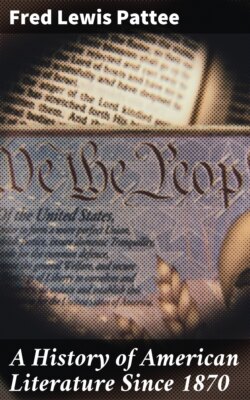Читать книгу A History of American Literature Since 1870 - Fred Lewis Pattee - Страница 29
На сайте Литреса книга снята с продажи.
VI
ОглавлениеTable of Contents
If Artemus Ward is Touchstone, Mark Twain is Lear's Fool. He was a knightly soul, sensitive and serious, a nineteenth-century knight errant who would protect the weak of the whole world and right their wrongs. The genuineness and honesty that had been ground into his soul on the river and in the mines where a man was a man only when he could show true manliness, were a part of his knightly equipment. When financial disaster came to him, as it had come to Scott, through no fault of his own, he refused to repudiate the debt as he might have done with no discredit to himself, and, though old age was upon him, he set out to earn by his own efforts the whole enormous amount. And he discharged the debt to the full. He had, moreover, the true knight's soul of romance. The Morte d'Arthur and the chronicles of Joan of Arc, his favorite reading, contained the atmosphere that he loved. He fain would have given his generation "pure literature," but they bade him back to his cap and bells. Richardson, as late as 1886, classed him with the purveyors of "rude and clownish merriment" and advised him to "make hay while the sun shines."[36]
So he jested and capered while his heart was heavy with personal sorrows that came thick upon him as the years went by, and with the baseness and weakness and misery of humanity as the spectacle passed under his keen observation. Yet in it all he was true to himself. That sentence in the preface tells the whole story: "I have written at least honestly." His own generation bought his books for the fun in them; their children are finding now that their fathers bought not, as they supposed, clownish ephemeræ, but true literature, the classics of the period.
And yet—strange paradox!—it was the cap and bells that made Mark Twain and that hastened the coming of the new period in American literature. The cap and bells it was that made him known in every hamlet and in every household of America, north and south and east and west, and in all lands across all oceans. Only Cooper and Mrs. Stowe of all our American authors are known so widely. This popularity it was that gave wings to the first all-American literature and that inspired a new school of American writers. After Mark Twain American literature was no longer confined to Boston and its environs; it was as wide as the continent itself.
